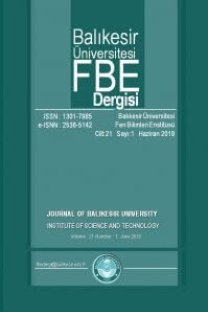3 boyutlu masa üstü yazıcı ile matematiksel bir modelden gerçek bir nesnenin dijital üretimi
Digital fabrication of a real object from a mathematical model by using 3D desktop printer
3D printing, mathematical modelling additive manufacturing,
___
- [1] Hull, C.W., Apparatus for production of three-dimensional objects by stereolithography. U.S.Patent 4,575,330 (Publication Date: 3/11/1986; Filing Date 8/8/1984). http://www.google.com/patents/US4575330. (10.06.2014).
- [2] Lim, C.S., Chua, C.K. ve Leong, K.F., Rapid prototyping, World Scientific, Second edition, (2003).
- [3] Cooper, K.G., Rapid prototyping pechnology, selection and application, Marcel Dekker Inc., (2001),
- [4] Crawford, S., How 3-D Printing Works, http://computer. howstuffworks.com/3- d-printing1.htm, (2013).
- [5] Rosen, D., Gibson, I. ve Stucker, B., Additive manufacturing technologies, Springer, (2010).
- [6] Knill, O. ve Slavkovsky, E., Illustrating Mathematics using 3D Printers, Cornel University Library, arXiv:1306.5599 [math.HO], (2013).
- [7] Rosen, D.E., MakerBot industries to print anything and everything at one metro tech. retrieved from commercial observer, http://commercialobserver.com/2012/05/makerbot-industries-to-print-anythingand-everything-at-one-metrotech/, (2014), (05.09.2014).
- [8] Rowan, D., 3D printing – An “Industrial Revolution in the Digital Age”? Retrieved from WIRED Business Future Shock http://www.wired.com/2011/05/3d-printing-an-industrial-revolution-in-thedigital-age/, (2011), (05.09.2011).
- [9] Berman B., 3-D printing: The new industrial revolution. Business Horizons, 55, 2, 155-162, (2012), DOI:10.1016/j.bushor.2011.11.003.
- [10] Segerman, H. 3D Printing for Mathematical Visualisation, The Mathematical Intelligencer, 34, 4, 56-62, (2012), DOI:10.1007/s00283-012-9319-7.
- [11] Chapela, V. M., Percino, M. J., Calvo, F. D., Calvo, F. ve Trinidad, L., Manufacture of 3D Möbius-Listing Models with a 3D Printer, Proceedings of the World Congress on Engineering Vol I, WCE 2013, July 3-5, London, U.K. (2013).
- [12] Slavkovsky, E.A., Feasibility study for teaching geometry and other topics using three-dimensional printers. M.L.A Thesis. Harvard University, (2012).
- [13] Gür, Y., Additive manufacturing of anatomical models from computed tomography scan data, MCB: Molecular and Cellular Biomechanics, 11, 4, 249-258, (2014), DOI:10.3970/mcb.2014.011.249.
- [14] Marcincin, J.N., Marcincinova,L.N., Barna,J. ve Janak,M., Application of FDM rapid prototyping technology in experimental gearbox development process, Tehnički Vjesnik-Technical Gazette, 19, 3, 689-694, (2012).
- [15] Taha, A., K3DSurf software package. URL:http://k3dsurf.sourceforge.net/. (04.01.2015).
- [16] Schoen, A.H., Infinite periodic minimal surfaces without self-intersections, NASA Technical Note TN D-5541, (1970).
- [17] Weber, M., Hoffmann, D. ve Hoffman J.T., Triply periodic level surfaces, http://www.msri.org/publications/sgp/jim/geom/level/library/triper/indexd.html (11.06.2017)
- [18] Knapp, M.E., Wolff, R. ve Lipson, H., Developing printable content: A repository for printable teaching models, Retrieved from http://utwired.engr.utexas.edu/lff/symposium/proceedingsArchive/ pubs/Manuscripts/2008/2008-52-Knapp.pdf, (2008).
- [19] MakerBot® MakerWare™ 3-D printing software, Retrieved from http://www.makerbot.com/support/makerware/ documentation/slicer/, (2014), (Retrieved 04.01.2015)
- ISSN: 1301-7985
- Yayın Aralığı: Yılda 2 Sayı
- Başlangıç: 1999
- Yayıncı: Balıkesir Üniversitesi
İnşaat endüstrisinde özel sektörde çalışan inşaat mühendislerini demotive eden faktörler
Gülden GÜMÜŞBURUN AYALP, Fatma ARSLAN
Ayşe Hadan DÖKMECİ, Suna Özden ÇELİK, Gül KAYKIOĞLU, Atakan ÖNGEN
Amorf dentritik agatta quasi kristallerin fraktal büyümesi
Bazı karbazol schiff bazlarının katyon bağlama özelliklerinin kondüktometrik incelenmesi
Tunceli ili Çemişgezek ilçesinin kent merkezindeki tarihi yapılarındaki bozunma analizi
Dere ağzı hidrodinamiğinin 3 boyutlu modellenmesi: Karışım ve tabakalı akım durumları
Ahmet Ozan ÇELİK, Volkan KİRİÇÇİ
Farklı çapraz bağlayıcılar ile hazırlanmış poliakrilamid hidrojellerinin değerlendirilmesi
Sema EKİCİ, Meziyet ÇETİK ERKOL
3 boyutlu masa üstü yazıcı ile matematiksel bir modelden gerçek bir nesnenin dijital üretimi
İnsan karbonik anhidraz I,II izoenzim aktiviteleri üzerine bazı tiyocrown eterlerin etkisi
